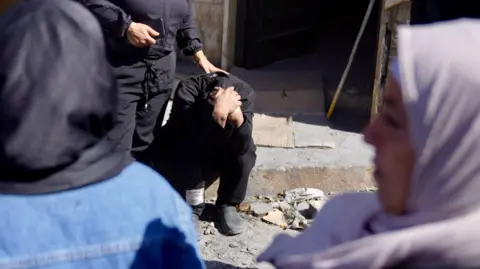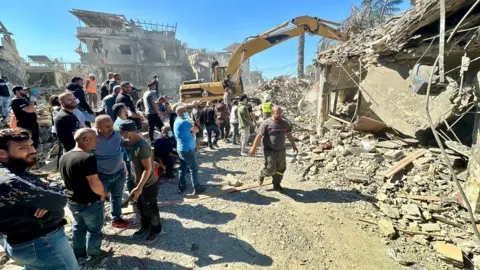
 BBC
BBC
“There are no Hezbollah here,” this distressed woman said. “We are all civilians”
Mohammed Sukayneh picked his way through slabs of rubble and twisted metal, clutching a few plastic bags - all he could recover from his home of 45 years.
It was brought down on top of him and his family last night by an Israeli airstrike, that killed at 18 people, four of them children, according to Lebanon’s Health Ministry.
The attack happened without warning in a place where people thought they would be safe – about 150 metres from the entrance to Lebanon’s largest public hospital, the Rafik Hariri hospital in southern Beirut.
Mohammed and his family were asleep in their beds.
“We didn't recognise what is happening,” he said.
“After the strike we hear the sound like ‘boom, boom, boom, boom’ like this. And everything is thrown on us. Stones, metal, steel, fresh blood, fresh meat on us. You couldn't speak, you couldn't breathe, you couldn't take your oxygen.”
He names five neighbours who are still under the rubble of their home. And there were others, killed in an instant, in their own neighbourhood – including two 19-year-old girls who were sitting outside his door.
Mohammed, 54, survived with a grazed arm, but his 20-year-old nephew is now in intensive care. “Half of his brain is crushed,” he said.
- Lebanon says 18 killed in Israeli strike near southern Beirut hospital
- Biden 'deeply concerned' about apparent leak of Israel plan to attack Iran
A civil defence worker at the scene told us six residential buildings had been brought down, most of them three or four stories high.
A veiled woman sat on the ground, with her hands on her head, rocking back and forth in distress. “There are no Hezbollah here,” she said, “we are all civilians”.
A neighbour said, “everyone flew through the air”.
Minutes later more remains were recovered from the rubble and carried away in a black body bag.
I asked Mohammed what he thought Israel could have been targeting, in this heavily populated area.
“They are hitting everything randomly,” he replied, his voice strengthened by anger.
“Without seeing there is children. Where are the guns here? Where are the rockets here? Blind, Israeli enemies. Blind.”


Monday evening's strike flattened a residential building and damaged others
The Israel Defense Forces (IDF) says it struck a "Hezbollah terrorist target near the hospital” without providing any information about what the target was. It says the hospital itself was not targeted or hit.
Rafik Hariri hospital director Jihad Saadeh said it was struck by shrapnel but is functioning normally and will not be evacuated.
Not so for the Al Sahel private hospital, about 2km away, which was emptied out last night.
“We evacuated instantly, like crazy,” says Dr Mazen Alameh, the general manager.
“We cannot risk anyone's lives. We cannot take it as granted that they (Israel) will not bomb.”
The hurried evacuation of 10 patients and 50 staff came after a public claim by the Israeli military that the hospital was sitting on top of a Hezbollah bunker, full of riches.
The IDF gave no proof but produced a 3D animation, claiming to show a bunker beneath the building. “There are hundreds of millions of dollars in cash and gold inside the bunker, right now,” said the IDF spokesman Rear Adm Daniel Hagari.
It sounded like an invitation to a heist.
BBC tours hospital Israel says sits above millions in Hezbollah gold
At the hospital today management and doctors gathered to deny “Israel’s false allegation” and give us a tour, including the two floors below ground. The hospital is in the southern suburbs, a Hezbollah stronghold, but staff insist strongly that it is not linked with any group.
“It's really shocking to say that Sahel Hospital is affiliated with any party in Lebanon,” says Dr Alameh. “It's a private hospital. It's a teaching hospital for doctors, physicians and other medical students."
He dismissed Israel’s claim of a hidden bunker. “The hospital was founded 40 years ago on an old house,” he said.
“It’s impossible to have any tunnel or infrastructure underneath. Any person in the world can come here and see everything they want.”
We were encouraged to check in every corner. Nowhere was off limits, not even the morgue. Bundles of surgical scrubs, and packets of surgical instruments were opened to show there was nothing concealed.
After the tour, we were allowed to move around freely. We saw empty wards and anxious staff, but no hint of a bunker.
Israel claimed the entrance was in a neighbouring building. We went there too and had free access to the parking lot underneath. If there was an entrance to a secret bunker, we did not find it.
The only door we saw led to a lift, which we could not open. But that door was not concealed, and seemed an unlikely access point to a hidden chamber full of gold.
On Tuesday an Israeli missile destroyed a building in broad daylight
As we left the hospital as an Israeli drone circled overhead in the sunshine. Israel says its air force is “monitoring the compound but it will not strike the hospital itself.”
For now, Al Sahel remains closed, but doctors want to get back to treating the sick.
“We are an institution helping people,” said Dr Walid Alameh, the medical director, and a cousin of Dr Mazen.
“The founder of this hospital is my father,” he said, becoming emotional. “This is my home. Hopefully tomorrow we will open."
But Israel is imposing its own wartime schedule here.
This afternoon it bombed Beirut again, a short drive from the hospital, and on Hezbollah’s doorstep.
A spokesman for the armed group had called a rare press conference.
As it was underway, the IDF issued a warning, telling residents of two nearby buildings to leave as they were “located near Hezbollah facilities.”
Half an hour later two more multi story buildings vanished from the skyline in seconds, reduced to dark clouds of smoke and ash.
In homes, and in hospitals here, many are stricken by fear.

 1 month ago
15
1 month ago
15









